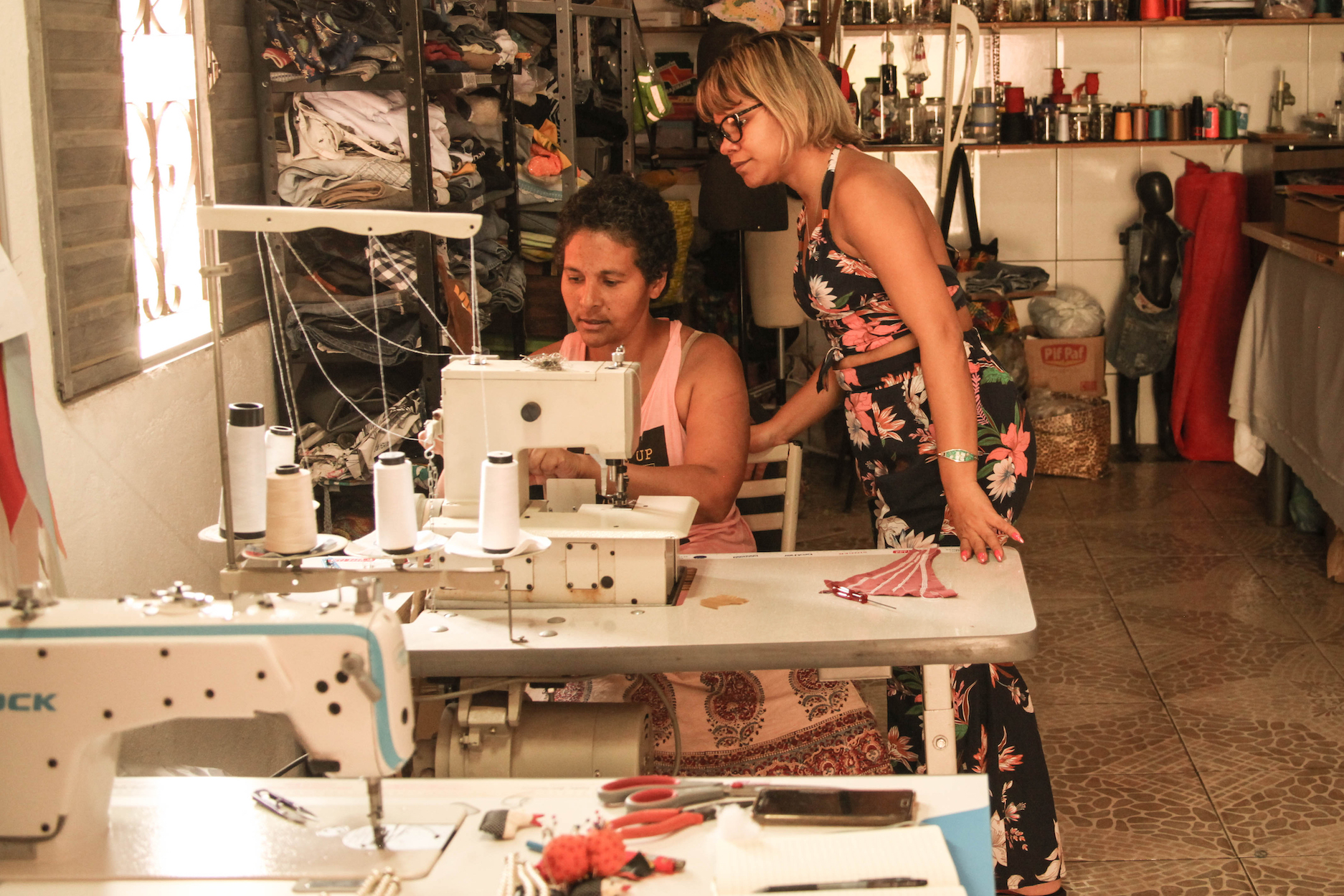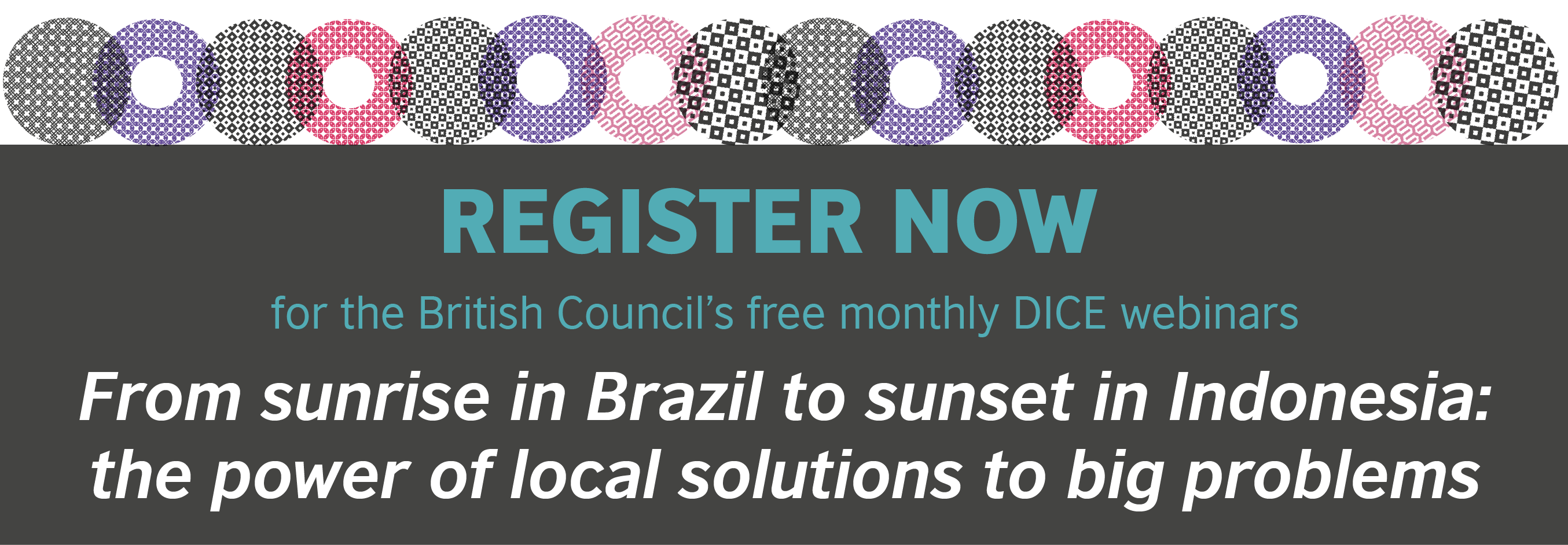Brazilian fashion collective models upcycled designs and favela pride in the UK
At the heart of one of Brazil’s largest favelas, a group of designers create edgy new fashions out of thrown-away garments. Through a collaboration with a UK enterprise, the Remexe clothing line has doubled its income and reached a new global audience.

High above the city of Belo Horizonte, colourful expanses of tenements cling to the mountainsides. This is Aglomerado Da Serra – one of the largest favelas (shanty towns) in Brazil, and a place where social and environmental issues are urgently felt.
La Da Favelinha is a cultural centre at the heart of this community. It works on a wide range of projects, empowering residents to express themselves creatively and generate revenue from their pursuits. An exemplar of this process is Remexe, a non-binary clothing line made wholly from upcycled materials. Through the Garota Hacker collaboration between La Da Favelinha and the London-based interactive arts enterprise ZU-UK, Remexe has reached a global audience and marketplace.
Remexe has a business model which sews together the ideals of sustainability, women’s and LGBTQ+ rights, and economic empowerment, seeking to put them squarely into practice. Its designers, predominantly local residents who identify as non-white women, make proud, expressive designs from used or discarded clothing.
Remexe shows that we can re-use what we’ve got to transform people’s lives
“It’s an approach to using what we have already got, the material is pure creativity,” says Jorge Lopes Ramos, co-founder of ZU-UK. “It’s looking at something that already exists and reinventing it, not just to add value to it, but to add vision. It shows we can re-use what we’ve got to transform people’s lives.”
This transformation, however, is designed to take place through the medium of partnership, not charity. Profits from the sales of each garment are split evenly between the designer and Garota Hacker in a system based on mutual respect, intended to promote self-sufficiency.
READ MORE: Our DICE Young Storymaker, Pedro Lira, goes behind the scenes at Remexe
The Remexe collections culminate in Favelinha Fashion Week, where the designers themselves model their work in interactive catwalk showcases, encouraging them to express themselves by celebrating identities which transcend Brazilian cultural norms.
Persis-Jade Maravala of ZU-UK says it began as an effort “reclaiming the famous fashion week and placing it right at the heart of the favela where people work, live and resist”. The Garota Hacker project has seen Remexe transcend its origins, bringing the heart of favela life to an international audience, with showcases across Brazil as well as in London and Bristol’s Cabot Circus late last year.
An opportunity that was nearly missed
For all its successes, the DICE-funded Garota Hacker collaboration came close to not happening at all. On an initial scoping visit, ZU-UK and La Da Favelinha found that their values aligned hugely, but they struggled to identify a project on which they could effectively work together. Until, that is, “just as we were leaving, we were asked to come see a little clothing project they had going on the side, so we went upstairs to this small atelier, where they explained Remexe and its inbuilt, sustainable approach, and it instantly chimed with our sense of who we are in the world and what we want to be doing”, recalls co-founder Persis-Jade. One year on, Remexe has more than doubled its revenue and increased the number of model-designers from four to 20, some of whom have been able to quit their jobs to pursue the project full time.

Additionally, the Garota Hacker collaboration has spawned further connections between ZU-UK, La Da Favelinha and a number of organisations in both the UK and Brazil. This will enable them to continue the project well into the future, pursuing their ultimate aim of developing Remexe as “something that can lead the way in reimagining what the fashion industry could be like”. The industry accounts for as much as 10% of global carbon emissions. This means that at a global level it could heed some of the sustainable lessons Garota Hacker offers.
ZU-UK’s role in the collaboration was to provide both practical, technological support as well as more holistic one-to-one development of the designers as artists. However, a key priority for them in the project was to avoid the power dynamics sometimes associated with co-operation between the developed and the developing world. As the collaboration progressed, they found that, if anything, their favela colleagues had just as much – if not more – to teach them than vice versa. With the UK’s reliance on disposability and “fast fashion”, there is much to be gained from more knowledge and expertise in the art of upcycling. To this end, the Remexe artists led several interactive workshops with UK designers ahead of their Bristol showcase; that led to the creation of Re:Wurk, a Bristol-based sister company to Remexe.
A brave celebration against hate
Beyond the practical techniques, there are profound lessons to be learned from the bravery of such proud celebration of LGBTQ+ culture in Brazil, where extreme homophobia and transphobia remain significant, from the favelas to the highest level of government.
Accompanying this intolerance is a very real threat of violence: 445 LGBTQ+ Brazilians died as victims of homophobia in 2017, according to watchdog Grupo Gay de Bahia. Yet, in the face of this hostility, Persis-Jade relates that the group members “have so much energy and dynamism, and an ability to resist in such a friendly and joyful way – it’s something that can definitely inspire us and show us what is possible”.
It is this expansion of possibilities that gives the project its name. Garota Hacker derives from a quote by Gilberto Gil, the popular Brazilian musician and culture minister from 2003 until 2008. “Who are the hackers?” he asked, answering, “They are the enablers of feasibility, enabling possibilities through techniques and technologies.”
The project demonstrates possibilities to us all, protecting the environment and promoting voices of members of the global community which might otherwise go unheard.
The British Council and the DICE Collaborators (including the organisations featured in this article) invite you to join them in the first of a series of interactive webinars on 4 August 2020 – The Collaboration Conversation and Gameshow Experience.
This is the first in a series of conversations about reducing inequalities, collaborating across borders and oceans, and operating impact-focused enterprises at a time of profound change. These free, monthly live events are co-hosted by impact-focused organisations in Brazil, Egypt, Indonesia, Pakistan and South Africa and their partners in the UK, and draw on their experience of collaborating across borders to address challenges such as youth unemployment, environmental catastrophe, disability rights, and gender inequality in local communities.
The first conversation focuses upon how to collaborate effectively across cultures, sectors, competitors and oceans. Find out more and register here.
The DICE Series tells the stories of collaborations which brought together enterprise development experts from the UK with specialists working in five emerging economies – Brazil, Egypt, Indonesia, Pakistan and South Africa – during 2019-20 with the aim of addressing entrenched issues of economic and social exclusion. Read more about the British Council’s DICE programme here.
Header photo of a Remexe fashion show by Launa Abreu. Central photo of Remexe designers by Artemis Brant


